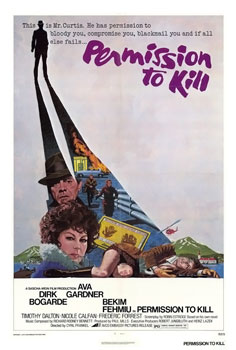
PERMISSION TO KILL
UK, 1977, 93 minutes, Colour.
Dirk Bogarde, Ava Gardner, Bekim Fehmiu, Timothy Dalton, Frederic Forrest.
Directed by Cyril Frankel.
Permission to Kill is a 70s-style espionage film – not so bleak as the cold war espionage films of the 1960s like The Kremlin Letter and The Quiller Memorandum, but grim nonetheless.
Bekim Fehmiu portrays the leader of a revolutionary group who wants to return to his country (presumably behind the iron curtain). However, western powers want to prevent him – and they are led by the British in charge, Dirk Bogarde. Various friends and collaborators from the past are assembled in order to persuade him not to return – and they include Ava Gardner and Timothy Dalton. However, they change their mind, something which was also anticipated by the western powers. This leads to cat-and-mouse activities, the dirtier side of espionage, intrigue and permission to kill.
The film was directed by Cyril Frankel who directed a number of small-budget films in Britain in the 1950s and worked mainly in television.
1. The meaning of the title, its tone? A good and satisfying thriller, the use of thriller and espionage conventions?
2. The importance of the colour, Panavision, Austrian locations? The international stars, international espionage?
3. Dirk Bogarde's portrayal of Curtis? The stiff upper lip, British type? The cold blooded British involved in this kind of espionage and control? The satire of the CIA type of investigator? The involvement of official espionage people in such ruthless programs? The temptation to play God, to have the truth? The inhumanity of Curtis? His ruthlessness, contriving people into places, their feelings? The irony of his telephone calls to his wife and the humanity of his cover and his saying 'God bless' etc? How conventional a type? A good portrait of this kind of conscienceless spy?
4. The importance of the introduction, the photos of the five people, the explanation of their various backgrounds? Curtis's hold over each of them? His moving them like a puppet master, their being aware of it? His contriving their presence in the one place? His self assurance for success? The variety of people involved and audience curiosity about them?
5. The organisation to which he belonged, their engineering of plots and double crosses? Their contacts, intelligence service, using of all the people?
6. Diakin as the opposite of Curtis? A filling in of his personality? Were his political aims and background clear? His plans? Why the interest in stopping him returning? The employment of Curtis and his organisation? Curtis as wanting to use pressures before violence but ready for violence? How genial a personality, as a political hero? His following, his group of close associates? How was he influenced by each of the persons under Curtis's control? How much did they influence his decisions, cause him to waver? The build-up of security and his return? The waste of his death?
7. Ava Gardner's portrait of Katina? Her role in Diakin's past, the child and her having him adopted out, Diakin's not knowing this? Why did they break? The presence of the child in Austria and its affect of Katina? Her not wanting Diakin to see the child? His actually going to seek out the child to see him? The emotional reaction when they both saw him? Her relationship with Allison and the plan? The build-up to the press conference, her helplessness as she watched Diakin die?
8. Lascarde, a portrait of the modern terrorist, as a girl involved in such violence, the interplay with Curtis with the sexual Innuendo? Her role in Curtis's plan? Her joining with Allison for the money? Curtis's control in getting the money back and using her Arab boyfriend as blackmail? Her not assassinating Diakin in the airport? The irony of her finally being shot?
9. Scott Allison as an American journalist, his past and friendship with Diakin, his being saved? His work for the paper and the promise of an interview? His wanting to take the money and his friendship with Lord? The ironies of their meeting in the church? Getting the money, his run through the snow, the build-up with Katina and almost saving Diakin's life?
10. Lord and his being blackmailed because of homosexuality? His role in Curtis's plan with the foreign office and the money? His hostility towards Curtis, his bowing under pressure, his change of attitude, meeting with Allison in the Church? The taking of the money, the chase and the brutality of his death without being operated on?
11. The world of power, politics, organisation, money? The irony of the way Diakin was killed with the simple press of a button from Curtis?
12. How real did the people and the events seen? How unreal? Is this the reality and unreality of the world of international espionage?